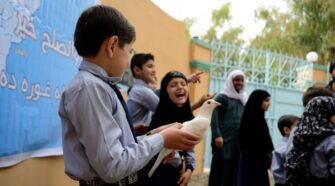Articles
Balancing Automation and Employment
In today’s world, artificial intelligence is growing at a tremendous rate and is also being implemented in our industries. As a result, it is replacing workers in factories, leading to an increase in unemployment. The integration of AI technology in the manufacturing process has the potential to revolutionize productivity and efficiency, but it is important …

Diabetes Treatment Options and Lifestyle Strategies
Adeel Maqbool BS MLT University of Okara Type 1 diabetes occurs when the body’s immune system attacks and destroys the cells in the pancreas that produce insulin, a hormone that regulates blood sugar levels. Type 1 diabetes typically develops during childhood or adolescence, and individuals with this form of diabetes require lifelong insulin therapy. Type …

Leadership Unveiling the Hidden Meanings
By: Seerat Fatima BS Health Nutrition University of Okara Ideal leadership is what we can learn from Prophet Muhammad (PBUH) and his companions. There is no better role model for leadership than him. The sign of a successful leader can be seen in who they consider to be their role model. The companions of Prophet …

Challenges and Concerns of Climate Change on GB
By: Altaf Kumail Gilgit-Baltistan, a region located in Pakistan, is witnessing severe repercussions due to climate change. The area is facing a multitude of risks, including increased instances of river floods, landslides caused by glacial lakes, unseasonal rains, and snowfalls. Regrettably, the governance system in Gilgit-Baltistan is plagued by weakness, and bureaucratic measures reminiscent of …

Cultural Mosaic Exploring the Diversity of Pakistan
By: Ayesha Saleem Student of Food Science Technology The University of Okara fizosaleem8878@gmail.com Culture is an integral whole that profoundly influences human ideas, actions, and ways of life. It encompasses knowledge, beliefs, arts, morals, customs, and all other capabilities and habits acquired by individuals as members of a society. Every great nation possesses its own …

Why Ethics is important in cyber security?
Muhammad Saqib The first principle of ethical cyber security is to protect the privacy of individuals . This means that any data that is collected should be done so with the explicit consent of the person or organization . Any data that is collected should be stored securely , and not shared without consent. This …

Decrease in Kinno Fruit Production
The decrease in Kinno fruit production in Sargodha can be attributed to various factors. Kinno oranges require specific climatic conditions to thrive. Any fluctuations in temperature, excessive heat, or prolonged cold spells can negatively affect the growth and production of the fruit. Changes in weather patterns, including irregular rainfall or drought, can also impact the …

Better Cotton Production Under Changing Climatic Regime of Pakistan
By: Muhammad Yasir Khurshid, Research and Development Officer, Engro Fertilizers Multan, Pakistan Pakistan, one of the world’s leading cotton producers, is grappling with the far-reaching consequences of climate change, which are taking a severe toll on the country’s cotton sector. Rising temperatures, erratic rainfall patterns, water scarcity, soil degradation, pest attacks, and diseases are among …

Inflation Rate in Pakistan and Petroleum Prices
By: Shah Muhammad Awan The relationship between petroleum prices and inflation is complex and can be influenced by various factors. While a decrease in petroleum prices can have an impact on certain aspects of inflation, it may not necessarily control inflation as a whole. In Pakistan, as in many countries, petroleum prices are an …

Peace Building in Afghanistan
By: Asif Khan and Zain Sadiq It has been a half-century now when there was stability in Afghanistan last time. Afghanistan is called the graveyard of superpowers, and for this reason, they are dragging each other in this ground from the time the world was bipolar. After that same region was used as a ground …


